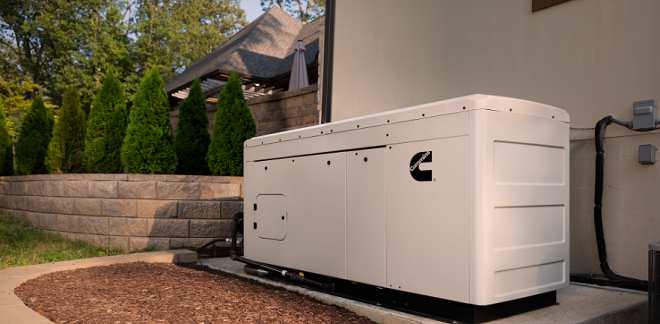Install a whole home generator!
Getting Prepared for Power Outages in 2024
Power outages can strike without warning, making it crucial to be prepared to ensure your comfort and safety. In this guide, we'll help you navigate the steps to take to lessen the impact of a power outage on your everyday life. We'll discuss the essential items you should have at your fingertips, the safety protocols to follow during a power outage, and tips on emergency readiness. We'll also touch on managing medical equipment and support during an outage. And remember, for any electrical needs or repairs, Sears Home Services is here to help.
KEY TAKEAWAYS
- Being prepared for a power outage is essential to ensure your safety and comfort.
- Plan ahead and have supplies ready for a power outage as they can happen at any time.
- Installing a whole-home backup generator can help you and your family stay safe during a power outage.
Your Must-Have Essentials
Being ready for a power outage means having the necessary supplies on hand. Here are some essentials you should consider:
- Lanterns or flashlights and batteries: Battery-powered light sources such as lanterns and flashlights are invaluable during a power outage. Keep a few of these handy around your home along with an ample supply of fresh batteries.
- Mobile phone: Your mobile phone can be a lifeline during a power outage. Ensure it's fully charged prior to an expected outage and consider investing in a portable power bank for extended backup.
- Non-perishable food and drink: Power outages can disrupt your ability to cook or refrigerate food. Stock up on non-perishable items like canned goods, granola bars, and bottled water. And remember to include a manual can opener in your emergency kit.
Staying Safe
It's crucial to observe certain safety measures during a power outage for your well-being. Here are some important steps:
- Turn off electrical appliances: Prevent damage to your appliances and avoid potential electrical hazards by switching off all non-essential electrical devices. Once power is restored, turn your appliances back on gradually to avoid overloading the system.
- Keep a light on: Keeping a single light on will let you know when the power is restored. This also prevents unexpected accidents and aids in navigation. Consider using an LED light or flashlight to conserve battery power.
- Stay warm and safe in winter: Power outages can lead to a loss of heating, so it's important to stay warm. Dress in layers, use blankets, and gather in one room to conserve heat. Avoid using fuel-burning equipment indoors to prevent carbon monoxide poisoning. If necessary, seek alternative shelter.
- Stay cool in summer: Your air conditioner won’t work during a power outage so follow the tips in our “How to Survive a Heat Wave” article.
By following these safety measures, you can lessen the impact of a power outage and maintain the safety and comfort of your household.
Get a Whole-Home Back-Up Generator
The best way to combat power outages is to install a whole-house back-up generator. Although this strategy is expensive, those homeowners that use a back-up generator consider the investment well worth it.
How a Back-Up Generator Works During Power Outages
An automatic transfer switch connects the whole-home back-up generator to the main electrical power supply for your house. The transfer switch monitors primary utility power and sends a signal to the generator controller when it detects a utility power failure. The transfer switch then connects backup generator power to your home’s electrical system when the switch receives the transfer signal from the generator controller.
The transfer switch also restores utility company power when it becomes available and sends a signal to the generator controller to shut off the backup generator.
How To Get a Whole-Home Back-Up Generator for Your House
Sears Home Services sells and installs Cummins whole-home generators. We’ve partnered with Cummins to offer a range of affordable whole home generators for almost any size of house.
Schedule a free in-home consultation with a Sears Expert to begin the process of protecting your home with a back-up generator.
- An energy consultant will visit your home and evaluate your back-up power needs, then suggest generator models that will provide dependable power during electrical outages.
- Our expert will discuss financing options for your new generator and work out installation details.
- The contractor will visit your home and professionally install your new Cummins whole-home generator.
Installing a whole house standby generator gives you the peace of mind that your home won’t lose power during a utility company power outage. With this automatic backup generator system, you can maintain normalcy in your home when your primary power supply goes out.

Have a Portable Generator Ready to Use During a Power Outage
If you’re not ready to get a whole-house back-up generator, we recommend that you have a portable generator ready to go when power outages occur. Portable generators are less expensive but they are limited in the amount of back-up electrical power that they can supply.
How a Portable Generator Can Help You During a Power Outage
The primary function of a portable generator is to provide electricity when the main power supply is interrupted. It can keep these essential appliances and devices running:
- Refrigerator and freezer. A portable generator can keep these appliances running during a power outage to prevent spoilage of perishable food items. You may also need to keep your refrigerator running to preserve medicine.
- Heater and room air conditioner. During extreme heat or cold conditions, a portable generator can power a heater or room air conditioner to keep indoor climate conditions safe during a power outage.
- Cooking appliances. Power up a stove, toaster oven or air fryer during a power outage with a portable generator. You may find that businesses in your area aren’t open during an extended blackout.
- Sump pump or well pump. Some homes need a generator to power a sump pump to prevent basement flooding or a well pump to provide water to their home during a power outage.
- Lighting. A portable generator can easily power lights for your convenience during a power outage.
Evaluate your needs and have a portable generator ready to go if it’s essential to your family’s safety and comfort during power outages.
When using a portable generator, follow the manufacturer's instructions, ensure proper ventilation to prevent carbon monoxide buildup, and avoid overloading the generator by plugging in too many appliances at once.
How to Find the Right Size of Portable Generator
- Calculate your power requirements. Make a list of the electrical devices and appliances you want to power during an outage or while using the generator and record their wattage ratings. You can usually find this information on the product label or in the owner’s manual. Add up the wattage of all the devices you wish to run simultaneously. This total will give you an estimate of the power you need.
- Add up starting wattage. Some devices, such as motors or compressors, require additional power during startup before settling into a lower running wattage. Check the specifications of devices with motors for both starting and running wattage. Make sure to account for the highest starting wattage in your calculations.
- Determine the peak and running load. Add up the running wattage for all devices you will use at one time without considering the starting wattage. This will be your running load. Calculate the peak load by adding the highest starting wattage from your list to the running wattage.
Select the generator size based on your peak load and running load. When you need a portable generator just to power a few essential devices like lights, refrigerator, and a small fan, a generator with a capacity of 2,000 to 3,000 watts should suffice.
If you want to power essential devices along with a few additional appliances like a sump pump or heater, consider a generator with a capacity of 3,000 to 5,000 watts.
Remember that these are general guidelines, and individual circumstances may vary. Always refer to the manufacturer's specifications and guidelines for the specific generator you are considering.
Emergency Readiness
Being prepared for a power outage involves taking certain steps. Following these tips can help keep you safe and minimize any inconvenience caused by unexpected power outages.
- Firstly, regularly save your work on electronic devices. Power outages can occur without warning, and unsaved work could be lost. Make it a habit to save your work often to avoid potential loss.
- Another vital step is to keep your car's fuel tank full. During a power outage, gas stations may be unable to pump fuel, leaving you unable to travel. A full tank gives you the flexibility to evacuate if necessary or run essential errands during a power outage.
- Additionally, consider signing up for priority services if available in your area if you don’t have a generator to supply backup power. Many utility companies offer priority services for individuals who rely on electric-powered medical equipment or have other essential needs. This ensures you receive assistance during a power outage and are a priority for power restoration.
Managing Medical Equipment
Ensuring that essential medical equipment has a battery backup or generator backup power to continue functioning during a power outage is crucial, particularly for individuals who rely on such devices for their health and well-being.
The first step is to assess the medical equipment you or your loved ones depend on. Identify devices such as oxygen concentrators, CPAP machines, ventilators, and other life-sustaining equipment that require electricity to operate. Check if these devices have built-in battery backups or if you need to purchase separate ones or get a backup generator.
Battery backups can provide peace of mind during power outages. They ensure continuous operation of essential medical equipment, protecting the health and safety of those who rely on them. Regularly test these backups to ensure they're functioning properly and fully charged.
Extended power outages can present additional challenges for individuals with medical needs. It's essential to prepare for such situations by having alternative plans. Consider discussing backup options, such as a backup generator or emergency power supplies, with your healthcare provider or medical equipment supplier.
Finally, invest time in learning about related safety topics and resources to enhance your readiness for power outages. Learn first aid techniques, emergency preparedness, and evacuation plans. Keep emergency contact numbers at hand, including those of your healthcare providers and local emergency services.
Install a whole home generator!
Have a backup when the power goes out. Get a free estimate so your home is prepared for the next power outage.
Was this information helpful?
Improve Generator Resources
Ensure uninterrupted power on game day with a reliable home generator.
Don't be left in the dark! Embrace the spirit of the solar eclipse and the importance of backup electrical power.
Find out the best brand of whole home generator at Sears Home Services.
Find the ideal size of back-up generator for your home at Sears Home Services. Our experts will help you determine the perfect generator for your needs.
